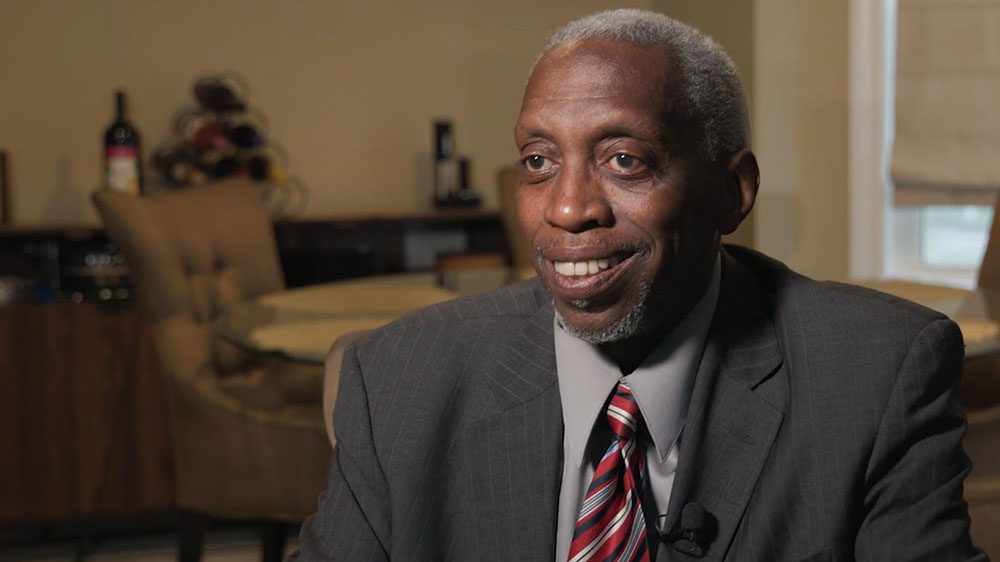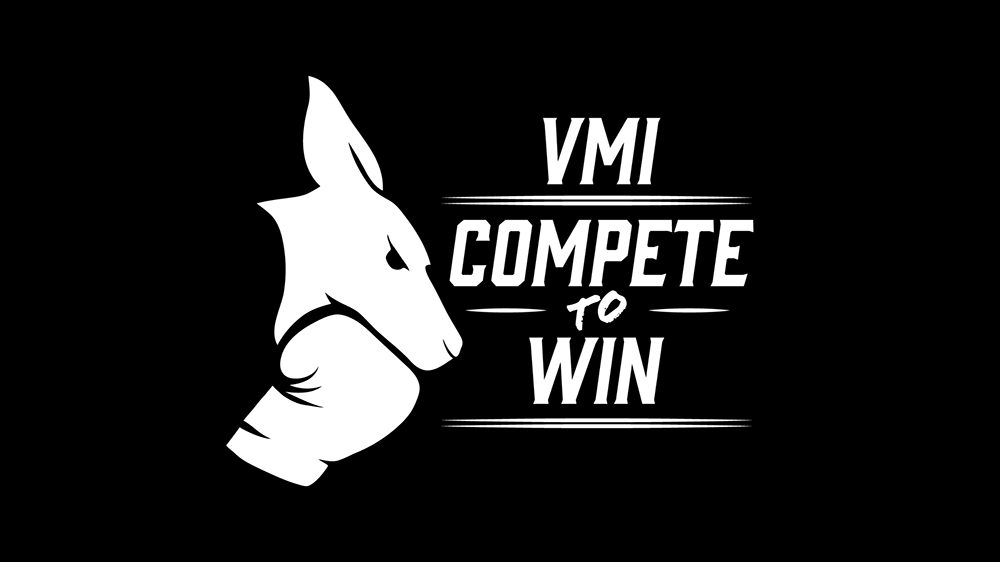For those old enough to remember VMI basketball games in “The Pit,” an affectionate term for Cormack Hall, Ron Carter Jr. ’78 needs no introduction. Alongside such legendary teammates as Dave Montgomery ’78, John Krovic ’77, Will Bynum ’77, and many others, Carter led the Keydets to not one but two Cinderella-style finishes among heady NCAA company, reaching the Elite Eight in 1976 and the Sweet Sixteen in 1977.
Along the way to those nail-biting championship appearances, there was palpable excitement in the air as hordes of fans packed the wooden bleachers in Cormack Hall to watch history being made as an unprecedented 34-game winning streak played itself out on the Keydets’ home court between 1976–1979.
With such accomplishments, Carter is in rare company among former cadet-athletes. Not only is Carter a member of the VMI Sports Hall of Fame, but alongside Montgomery and Reggie Williams ’08, he’s one of only three VMI players to have his jersey retired, an event that took place the same year he graduated.
After graduation, Carter kept moving in even more elite circles, becoming a first-round draft pick for the Los Angeles Lakers, where he played alongside Magic Johnson and Kareem Abdul-Jabbar. To date, he and Williams are the only former Keydets to have played in the NBA.
But as any athlete knows, fame is fleeting, and the glow of yesteryear’s glory fades as the years roll by. After VMI, Carter earned a Master of Business Administration degree from Pepperdine University and went on to a successful career in business. He and his wife, Darnella, raised their four children to achieve—and they’ve more than met that goal. Between them, members of the Carter family now hold eight undergraduate degrees and six graduate degrees, and that’s in just two generations.
Today, at age 67, Carter is thankful for all the opportunities he was given and even more appreciative of VMI.
“VMI offered me an opportunity to get an education and go on and succeed in sports, business, and the military,” he stated. His advice to young athletes is straightforward: “If you get a VMI scholarship offer, sign it in blood because it’s one of the greatest opportunities of a lifetime.”
Carter’s story begins in his native Pittsburgh, Pennsylvania, where he and his family lived in a public housing development. No one in his family had been to college, and basketball was Carter’s ticket to opportunity. As the end of high school neared, the 6’5” guard was contemplating accepting an offer from an Ivy League university, but then two visitors arrived. Bill Blair ’64 and Charlie Schmaus ’66, then-VMI basketball coaches, showed up on a recruiting visit. The visit didn’t go as planned, but the outcome was still favorable for Carter—and VMI.
“I broke my wrist in the first five minutes of the game, and they took me to the hospital,” Carter related. “They took me to Providence Hospital, and en route, they offered me a scholarship to VMI. I had no idea how amazing that was.”
"People know that if you spend four years at the Virginia Military Institute and graduate—you did something really important."
Ron Carter ’78
Carter had never thought of himself as the kind of person who would go to a military school, but he wasn’t fazed by that aspect of VMI, either. “I was so focused on competing at a Division I level that the military challenge was less important,” he noted. “Let me say it that way. But I’ve told many alumni—we came from neighborhoods that were so tragic and so dangerous and drug infested that this was a better deal.”
During his cadetship, not only did Carter go on to hold rank in the Corps, becoming VMI’s first African American battalion commander, but he also became the public face of the basketball team’s superstar success, frequently pictured in newspapers sporting the No. 13 jersey that would someday hang from the rafters of Cameron Hall. What’s more, he and his teammates all laid the foundations for their future success after VMI.
Curt Reppart ’76, a key player on the 1976 team that defeated the powerhouse University of Tennessee Volunteers, went on to become a dentist. Teammate Dave Slomski ’77 became an attorney, as did Andy Kolesar ’81—who was also honored as an Academic All-American in a ceremony held in Madison Square Garden.
“The guys [who] I played with, they all went pro,” said Carter, who earned a Bachelor of Arts degree in economics from VMI. “Not NBA, not NFL, not Major League Baseball, not Soccer League, but they all went pro. They became professionals in the military, doctors, engineers, psychologists … VMI is a remarkable institution. And I’m hoping that this whole idea of the portal, if we can get past it, and explain to young people, men and women, that if you stay and graduate from Virginia Military Institute, you may not go pro in sports, but you’re going pro. That’s pretty much the deal if you go to VMI.”
For Carter, getting young athletes to see the long-range view—a view that extends beyond the easy-exit allure of the transfer portal—is a point of particular urgency. “But if you stick it out—people know that if you spend four years at the Virginia Military Institute and graduate—you did something really important,” Carter stated. “And there, there’s a bunch of men and women around this country and around the world that will hire you, just for that reason.”
After all, Carter’s life story bears it out: From dreaming and dribbling in a tough neighborhood to a storybook Division I career to the NBA—and then a post-graduate degree and a second career. He’d be the first to tell you it wouldn’t have happened without his VMI education: Small class sizes, professors who know cadets by name, and an unwavering dedication to delivering the best undergraduate education possible.
“The value of being a graduate of the Virginia Military Institute is unmeasurable.”
-

Victoria Ferris Social Media and Communications Strategist
The social media and communications strategist is responsible for creating compelling, audience-appropriate, multi-channel content for social media, and for monitoring the VMI Alumni Agencies' social media accounts. The strategist supports all communications efforts, including email marketing deployment and training, website updating, and video editing.

Mary Price Development Writer/Communications Specialist
The development writer plays a key role in producing advancement communications. This role imagines, creates, and produces a variety of written communication to inspire donors to make gifts benefiting VMI. Utilizing journalistic features and storytelling, the development writer will produce content for areas such as Annual Giving, stewardship, and gift planning.




